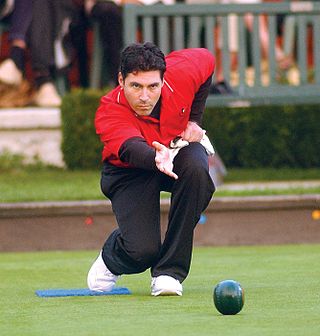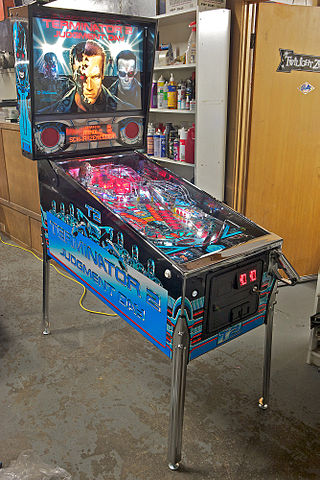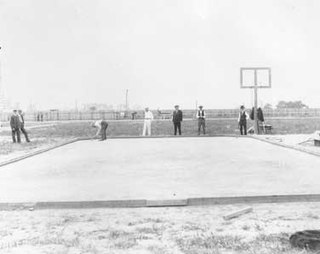
Cue sports are a wide variety of games of skill played with a cue, which is used to strike billiard balls and thereby cause them to move around a cloth-covered table bounded by elastic bumpers known as cushions. Cue sports are also collectively referred to as billiards, though this term has more specific connotations in some varieties of English.

Bowls, also known as lawn bowls or lawn bowling, is a sport in which players try to roll their ball closest to a smaller ball. The bowls are heavier on one side so that they turn when being rolled. The game is played either in teams or one against one.

Table tennis is a racket sport derived from tennis but distinguished by its playing surface being atop a stationary table, rather than the court on which players stand. Either individually or in teams of two, players take alternating turns returning a light, hollow ball over the table's net onto the opposing half of the court using small rackets until they fail to do so, which results in a point for the opponent. Play is fast, requiring quick reaction and constant attention, and is characterized by an emphasis on spin, which can affect the ball's trajectory more than in other ball sports.

Pinball games are a family of games in which a ball is propelled into a specially designed table where it bounces off various obstacles, scoring points either en route or when it comes to rest. Historically the board was studded with nails called 'pins' and had hollows or pockets which scored points if the ball came to rest in them. Today, pinball is most commonly an arcade game in which the ball is fired into a specially designed cabinet known as a pinball machine, hitting various lights, bumpers, ramps, and other targets depending on its design.

Pétanque is a sport that falls into the category of boules sports. In these sports, players or teams play their boules/balls towards a target ball. In pétanque the objective is to score points by having boules closer to the target than the opponent after all boules have been thrown. This is achieved by throwing or rolling boules closer to the small target ball, officially called a jack, or by hitting the opponents' boules away from the target, while standing inside a circle with both feet on the ground. The game is normally and best played on hard dirt or gravel. It can be played in public areas in parks or in dedicated facilities called boulodromes.

Bar billiards is a form of billiards which involves scoring points by potting balls in holes on the playing surface of the table rather than in pockets. Bar billiards developed from the French/Belgian game billard russe, of Russian origin. The current form started in the UK in the 1930s and now has leagues in Norfolk, Sussex, Berkshire, Oxfordshire, Buckinghamshire, Surrey, Kent, Cambridgeshire, Hampshire, Suffolk, Yorkshire and Northamptonshire. These counties comprise the All England Bar Billiards Association. There are also leagues in Guernsey and Jersey where the annual world championships take place.

English billiards, called simply billiards in the United Kingdom and in many former British colonies, is a cue sport that combines the aspects of carom billiards and pool. Two cue balls and a red object ball are used. Each player or team uses a different cue ball. It is played on a billiards table with the same dimensions as one used for snooker and points are scored for cannons and pocketing the balls.

Skittles is a historical lawn game and target sport of European origin, from which the modern sport of nine-pin bowling is descended. In regions of the United Kingdom and Ireland the game remains as a popular indoor pub game.

Roque is an American variant of croquet played on a hard, smooth surface. Popular in the first quarter of the 20th century and billed "the Game of the Century" by its enthusiasts, it was an Olympic sport in the 1904 Summer Games, replacing croquet from the previous games.

This is a general glossary of the terminology used in the sport of cricket. Where words in a sentence are also defined elsewhere in this article, they appear in italics. Certain aspects of cricket terminology are explained in more detail in cricket statistics and the naming of fielding positions is explained at fielding (cricket).
The following is a glossary of the terminology currently used in the sport of golf. Where words in a sentence are also defined elsewhere in this article, they appear in italics. Old names for clubs can be found at Obsolete golf clubs.

Table skittles is a game in which a ball or spinning top is used to knock over skittles on a small board, usually placed on a table. Table skittles are almost always made of wood.

Four-ball billiards or four-ball carom is a carom billiards game, played on a pocketless table with four billiard balls, usually two red and two white, one of the latter with a spot to distinguish it. Each player is assigned one of the white balls as a cue ball. A point is scored when a shooter's cue ball caroms on any two other balls in the same shot. Two points are scored when the shooter caroms on each of the three object balls in a single shot. A carom on only one ball results in no points, and ends the shooter's inning.

A rack is a piece of equipment that is used to place billiard balls in their starting positions at the beginning of a pocket billiards game. Rack may also be used as a verb to describe the act of setting billiard balls in their starting positions, or as a noun to describe a set of balls that are in their starting positions.
The following is a glossary of traditional English-language terms used in the three overarching cue sports disciplines: carom billiards referring to the various carom games played on a billiard table without pockets; pool, which denotes a host of games played on a table with six pockets; and snooker, played on a large pocket table, and which has a sport culture unto itself distinct from pool. There are also games such as English billiards that include aspects of multiple disciplines.

A lawn game is an outdoor game that can be played on a lawn. Many types and variations of lawn games exist, which includes games that use balls and the throwing of objects as their primary means of gameplay. Some lawn games are historical in nature, having been devised and played in different forms for centuries. Some lawn games are traditionally played on a pitch. Some companies produce and market lawn games for home use in a front or backyard.

Five-pin billiards or simply five-pins or 5-pins, is today usually a carom billiards form of cue sport, though sometimes still played on a pocket table. In addition to the customary three balls of most carom games, it makes use of a set of five upright pins (skittles) arranged in a "+" pattern at the center of the table. The game is popular especially in Italy and Argentina, but also in some other parts of Latin America and Europe, with international, televised professional tournaments. It is sometimes referred to as Italian five-pins or Italian billiards, or as simply italiana. A variant of the game, goriziana or nine-pins, adds additional skittles to the formation. A related pocket game, with larger pins, is played in Scandinavia and is referred to in English as Danish pin billiards, with a Swedish variant that has some rules more similar to the Italian game.

Snooker is a cue sport that is played on a baize-covered snooker table with pockets in each of the four corners and in the middle of each of the long side cushions. It is played using a cue and snooker balls: one white cue ball, 15 red balls worth one point each, and six balls of different colours: yellow, green (3), brown (4), blue (5), pink (6), black (7). A player wins a frame of snooker by scoring more points than the opponent(s), using the cue ball to pot the red and coloured object balls. A player wins a match when they have achieved the best-of score from a pre-determined number of frames. The number of frames is always odd so as to prevent a tie or a draw.

Basque bowls, is one of the few Basque rural sports which do not originate in an activity related to rural or marine work. It has a number of other names too and is played in a bolatoki or bolaleku "bowls place" which often consists of a playing area in the open, an open sided structure with a low roof or a playing area located inside a colonnaded hallway.
Carom billiards and pool are two types of cue sports or billiards-family games, which as a general class are played with a stick called a cue which is used to strike billiard balls, moving them around a cloth-covered billiard table bounded by rubber cushions attached to the confining rails of the table.

















